This article needs additional citations for verification .(July 2018) |

Harvey Milk Plaza is a transit plaza at the Castro Muni Metro subway station commemorating Harvey Milk, in San Francisco's Castro District, in the U.S. state of California.
This article needs additional citations for verification .(July 2018) |

Harvey Milk Plaza is a transit plaza at the Castro Muni Metro subway station commemorating Harvey Milk, in San Francisco's Castro District, in the U.S. state of California.
Harvey Milk, the site's namesake, was a gay man who moved to Castro District of San Francisco in 1972 and went on to become a beloved community activist. In 1977, Milk was elected to the San Francisco Board of Supervisors to represent District 5 (today, District 8), the district in which the plaza stands. Eleven months later, Milk was assassinated in his office at San Francisco City Hall. In response, the community sought to recognize Milk by renaming the above-ground construction related to the Castro Muni Station, which opened in 1980, to be "Harvey Milk Plaza". In 1985, the plaza was officially dedicated to Harvey Milk. In attendance were Mayor Dianne Feinstein, Harvey Milk's successor to the SF Board of Supervisors, Harry Britt, and President of the Board of Supervisors, John Molinari. [1] In 1997, to celebrate the 20th anniversary of Harvey Milk's election to the SF Board of Supervisors, a flagpole dedicated to Milk and the openly LGBTQ+ politicians who followed was added to the site. The flagpole flies the iconic Rainbow Flag designed by SF-based artist Gilbert Baker that has become a world-wide symbol for the LGBTQ+ community. In 2006, photographs from various stages of Milk's life were installed in the plaza and "blessed" by the Sisters of Perpetual Indulgence.
The Castro Muni Station [2] and Harvey Milk Plaza were designed by the architectural firm Reid & Tarics Associates. Howard Grant AIA is reported to have been in charge of design. In 2016, SFMTA announced plans for a large project to increase accessibility for the Castro Muni Station located under the plaza. The announcement led to the formation of The Friends of Harvey Milk Plaza, a group of community members advocating for community involvement in the redesign effort. [3] In 2017, the Friends of Harvey Milk Plaza and the American Institute of Architects (AIASF) launched an international design competition [4] to reimagine the plaza in response to decades of conversation around improving the site to better represent Harvey Milk, who by now had become an internationally recognized LGBT civil rights icon. [5]
In 2017, designs were submitted to renovate the plaza. [6] The winning submission belonged to architecture firm Perkins Eastman [7] who went on to produce some initial design concepts for the project.
In 2019, the Harvey Milk Plaza project secured a $1M grant from the State of California intended to “support construction of LGBTQ space in Harvey Milk Plaza.” [8] In 2021, the Friends of Harvey Milk Plaza announced the selection of landscape architecture firm SWA [9] to serve as the new design lead for the project.
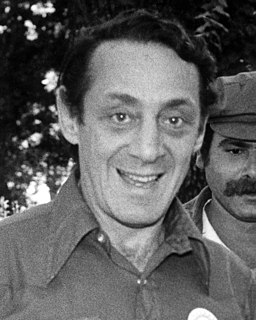
Harvey Bernard Milk was an American politician and the first openly gay man to be elected to public office in California, as a member of the San Francisco Board of Supervisors. Milk was born and raised in New York where he acknowledged his homosexuality as an adolescent, but chose to pursue sexual relationships with secrecy and discretion well into his adult years. His experience in the counterculture of the 1960s caused him to shed many of his conservative views about individual freedom and the expression of sexuality.
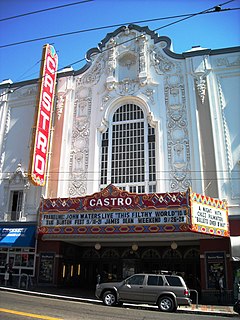
The Castro Theatre is a historic movie palace in San Francisco that became San Francisco Historic Landmark #100 in September 1976. Located at 429 Castro Street in the Castro District, it was built in 1922 with a California Churrigueresque façade that pays homage—in its great arched central window surmounted by a scrolling pediment framing a niche—to the basilica of Mission Dolores nearby. Its designer, Timothy L. Pflueger, also designed Oakland's Paramount Theater and other movie theaters in California during that period. The theater has over 1,400 seats. The theater's ceiling is the last known leatherette ceiling in the United States and possibly the world. Another leatherette ceiling was demolished just a few years ago. To make the ceiling look as though it is leather requires a special technique regarded as lost today.

The SF LGBT Center is a nonprofit organization serving the lesbian, gay, bisexual, transgender, and queer community of San Francisco, California, and nearby communities, located at 1800 Market Street in San Francisco. The mission of the SF LGBT Center is "to connect the diverse LGBTQ+ community to opportunities, resources, and each other to achieve a stronger, healthier, and more equitable world for LGBTQ+ people and our allies."
This is a list of notable events in the history of LGBT rights that took place in the year 1978.

Castro station is a Muni Metro station at the intersection of Market Street, Castro Street, and 17th Street in The Castro district of San Francisco, California.
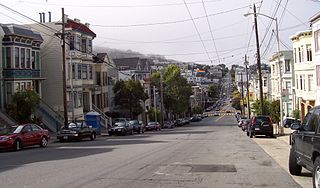
Eureka Valley is a neighborhood in San Francisco, primarily a quiet residential neighborhood but boasting one of the most visited sub-neighborhoods in the city, The Castro.

Diamond Heights is a neighborhood in central San Francisco, California, roughly bordered by Diamond Heights Boulevard and Noe Valley to the north and east and Glen Canyon Park to the south and west. It is built on three hills: Red Rock Heights on the northwest, Gold Mine Hill in center, and Fairmount Heights on the southeast.

Based in San Francisco, California, the Harvey Milk Lesbian, Gay, Bisexual, Transgender, Queer Democratic Club is a chapter of the Stonewall Democrats, named after LGBT politician and activist Harvey Milk. Believing that the existing Alice B. Toklas LGBT Democratic Club would never support him in his political aspirations, Milk co-founded the political club under the name "San Francisco Gay Democratic Club" in the wake of his unsuccessful 1976 campaign for the California State Assembly. Joining Milk in forming the club were a number of the city's activists, including Harry Britt, Dick Pabich, Jim Rivaldo, and first club president Chris Perry.
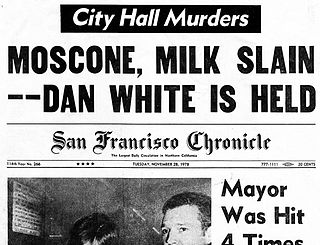
On November 27, 1978, San Francisco Mayor George Moscone and San Francisco Supervisor Harvey Milk were shot and killed in San Francisco City Hall by former Supervisor Dan White. On the morning of that day, Moscone intended to announce that the Supervisor position White resigned from would be given to someone else. White, angered, entered City Hall before the scheduled announcement time and first shot Moscone in the Mayor's office, then Harvey Milk in White's former office space, before escaping the building. Board of Supervisors President Dianne Feinstein first announced Moscone and Milk's deaths to the media, and because of Moscone's death, succeeded him as Acting Mayor of San Francisco.
The San Francisco Bay Times, the first LGBTQ newspaper founded jointly and equally by gay men and women, launched in 1978 and remains one of the largest and oldest LGBTQ newspapers in Northern California. The business includes the 24/7 live-streaming Castro Street Cam that streams Harvey Milk Plaza and the Castro live to the world, serving as an emotional lifeline to LGBTQ people elsewhere, including internationally, who seek connection due to isolation in their regions. It also includes the LGBTQ news and events service "Betty's List," as well as "Harvey's List" and the "Bay Times List."
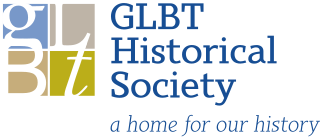
The GLBT Historical Society maintains an extensive collection of archival materials, artifacts and graphic arts relating to the history of LGBT people in the United States, with a focus on the LGBT communities of San Francisco and Northern California.
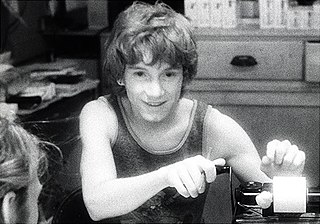
Daniel Nicoletta is an Italian-American photographer, photojournalist and gay rights activist.

Anne Kronenberg is an American political administrator and LGBT rights activist. She is best known for being Harvey Milk's campaign manager during his historic San Francisco Board of Supervisors campaign in 1977 and his aide as he held that office until he and mayor George Moscone were assassinated. As an openly lesbian political activist, Kronenberg was noted for her instrumental role in the gay rights movement, both for Milk's campaign and in her own right, though she has since married a man.

The Pink Triangle Park is a triangle-shaped mini-park located in the Castro District of San Francisco, California. The park is less than 4,000 square feet (370 m2) and faces Market Street with 17th Street to its back. The park sits directly above the Castro Street Station of Muni Metro, across from Harvey Milk Plaza. It is the first permanent, free-standing memorial in America dedicated to the thousands of persecuted homosexuals in Nazi Germany during the Holocaust of World War II.
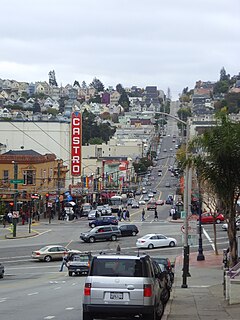
The lesbian, gay, bisexual and transgender (LGBT) community in San Francisco is one of the largest and most prominent LGBT communities in the United States, and is one of the most important in the history of American LGBT rights and activism alongside New York City. The city itself has, among its many nicknames, the nicknames "gay capital of the world", and has been described as "the original 'gay-friendly city'". LGBT culture is also active within companies that are based in Silicon Valley, which is located within the southern San Francisco Bay Area.

The Castro District, commonly referred to as the Castro, is a neighborhood in Eureka Valley in San Francisco. The Castro was one of the first gay neighborhoods in the United States. Having transformed from a working-class neighborhood through the 1960s and 1970s, the Castro remains one of the most prominent symbols of lesbian, gay, bisexual, and transgender (LGBT) activism and events in the world.

United Nations Plaza is a 2.6-acre (1.1 ha) plaza located on the former alignments of Fulton and Leavenworth Streets—in the block bounded by Market, Hyde, McAllister, and 7th Street—in the Civic Center of San Francisco, California. It is located 1⁄4 mi (0.40 km) east of City Hall and is connected to it by the Fulton Mall and Civic Center Plaza. Public transit access is provided by the BART and Muni Metro stops at the Civic Center/UN Plaza station, which has a station entrance within the plaza itself.

A special election was held for Mayor of the City and County of San Francisco on June 5, 2018, to fill the remainder of the term of Ed Lee, who had died in office on December 12, 2017. Upon Lee's death, London Breed, President of the San Francisco Board of Supervisors, became Acting Mayor of San Francisco, but a vote of six supervisors replaced Breed with Supervisor Mark Farrell. The mayoral election was held concurrently with the statewide direct primary election. In San Francisco, the election for the eighth district member of the board of supervisors was also on the ballot.

Rafael Mandelman is an American attorney and politician currently serving on the San Francisco Board of Supervisors, representing District 8.
The Rainbow Honor Walk (RHW) is a walk of fame installation in San Francisco, California to honor notable lesbian, gay, bisexual, transgender, and queer (LGBTQ) individuals from around the world "who left a lasting mark on society." Its bronze plaques honor LGBTQ individuals who "made significant contributions in their fields". The plaques mark a walk located within the business district of the Castro neighborhood, which for decades has been the city's center of LGBTQ activism and culture.
Coordinates: 37°45′45″N122°26′07″W / 37.762401°N 122.435339°W